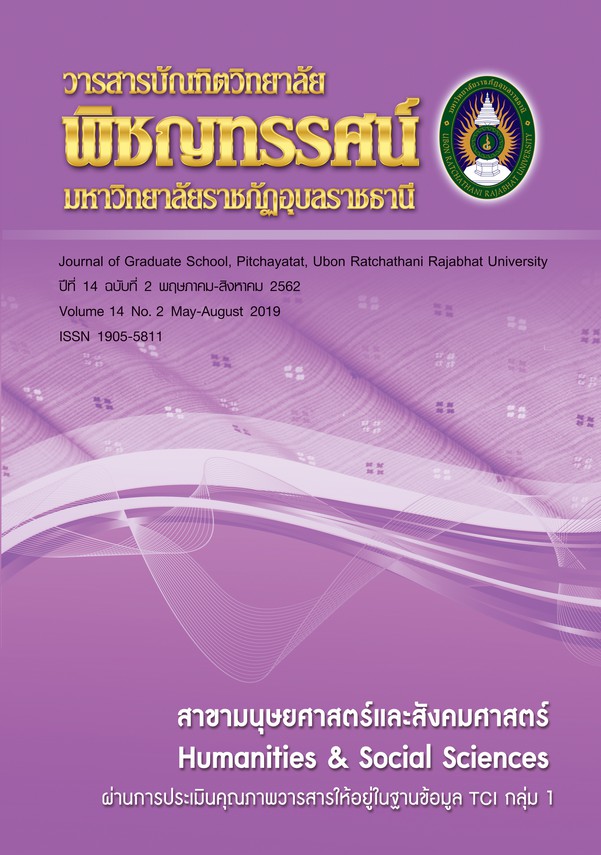การจัดการสินค้าวัฒนธรรมในพื้นที่เขตเศรษฐกิจพิเศษลุ่มน้ำโขง
คำสำคัญ:
สินค้าวัฒนธรรม, การจัดการ, เขตเศรษฐกิจพิเศษลุ่มน้ำโขงบทคัดย่อ
บทความวิจัยนี้มีวัตถุประสงค์เพื่อ 1.ศึกษาปัจจัยเชิงสาเหตุที่ส่งผลต่อการจัดการสินค้าวัฒนธรรมในพื้นที่เขตเศรษฐกิจพิเศษลุ่มน้ำโขง 2. สร้างรูปแบบการพัฒนาการจัดการสินค้าวัฒนธรรมในพื้นที่เขตเศรษฐกิจพิเศษลุ่มน้ำโขง 3.ยืนยันรูปแบบการพัฒนาการจัดการสินค้าวัฒนธรรมในพื้นที่เขตเศรษฐกิจพิเศษลุ่มน้ำโขง โดยมีกลุ่มตัวอย่าง จำนวน 544 คน เครื่องมือที่ใช้เป็นแบบสอบถามที่มีค่าอำนาจจำแนกอยู่ระหว่าง 0.20 - 0.78 และมีค่าความเชื่อมั่นทั้งฉบับเท่ากับ 0.98 สถิติที่ใช้ในการวิเคราะห์ข้อมูล ได้แก่ ความถี่ ร้อยละ ค่าเฉลี่ย ส่วนเบี่ยงเบนมาตรฐาน ค่าสัมประสิทธิ์สหสัมพันธ์เพียร์สัน ค่าความเบ้ ค่าความโด่ง และการวิเคราะห์สมการโครงสร้างเชิงเส้นด้วยโปรแกรมสำเร็จรูป ผลการวิจัยพบว่า รูปแบบจำลองสมมติฐานมีความสอดคล้องกับข้อมูลเชิงประจักษ์ ซึ่งพิจารณาจากค่าสถิติ X2/df = 4.40, RMSEA =0 .079, SRMR = 0.039 , CFI = 0.93 และ TLI = 0.92 พบว่าปัจจัยเชิงสาเหตุที่ส่งผลต่อการจัดการสินค้าวัฒนธรรมในพื้นที่เขตเศรษฐกิจพิเศษลุ่มน้ำโขงประกอบด้วยอิทธิพลโดยรวมมีนัยสำคัญทางสถิติที่ระดับ 0.01 โดยเรียงลำดับจากค่าสัมประสิทธิ์อิทธิพลโดยรวมจากมากไปหาน้อย คือ ปัจจัยด้านภาวะผู้นำกลุ่ม (0.97) ปัจจัยด้านภาคีเครือข่ายภายนอก (0.41) ปัจจัยด้านการจัดการ (0.34) และปัจจัยด้านสมรรถนะสมาชิกกลุ่ม 0.26) ผลการสร้างรูปแบบการจัดการสินค้าวัฒนธรรมในพื้นที่เขตเศรษฐกิจพิเศษลุ่มน้ำโขง พบว่ามีแนวทางการพัฒนาจำนวน 5 ด้าน 16 ประเด็น และ 80 แนวทางการพัฒนา ได้แก่ 1) การพัฒนาด้านผู้นำกลุ่ม ประกอบด้วย 3 ประเด็น 15 แนวทางการพัฒนา 2) การพัฒนาด้านสมรรถนะสมาชิกกลุ่ม ประกอบด้วย 3 ประเด็น 15 แนวทางการพัฒนา 3) การพัฒนาด้านภาคีเครือข่ายภายนอก ประกอบ ด้วย 3 ประเด็น 15 แนวทางการพัฒนา 4) การพัฒนาด้านการจัดการประกอบด้วย 3 ประเด็น 15 แนวทางการพัฒนา และ 5) การพัฒนาด้านความสำเร็จประกอบด้วย 4 ประเด็น 20 แนวทางการพัฒนา 3.ผลการยืนยันรูปแบบการจัดการสินค้าวัฒนธรรมในพื้นที่เขตเศรษฐกิจพิเศษลุ่มน้ำโขง โดยผู้เชี่ยวชาญจำนวน 20 คน พบว่า รูปแบบการจัดการสินค้าวัฒนธรรมในพื้นที่เขตเศรษฐกิจพิเศษลุ่มน้ำโขงในทุกด้านสอดคล้องกันในระดับมากที่สุด (Md.=5) และมีค่าพิสัยระหว่างควอไทล์ (I.R.) ที่ระดับ 0.00 ทุกแนวทางการพัฒนา
เอกสารอ้างอิง
คณะกรรมการพัฒนาการเศรษฐกิจและสังคมแห่งชาติ,สำนักงาน.แผนพัฒนาเศรษฐกิจและสังคมแห่งชาติฉบับที่ 11(2555-2559).กรุงเทพฯ: สำนักนายกรัฐมนตรี, 2554.
ณรงค์ เพ็ชรประเสริฐ. ธุรกิจชุมชนเส้นทางที่เป็นไปได้. กรุงเทพฯ: กองทุนสนับสนุนการวิจัย, 2542.
ณรงค์ เส็งประชา. มนุษย์กับสังคม.พิมพ์ครั้งที่ 4. กรุงเทพฯ: โอ.เอส. พริ้นติ้ง เฮาส์, 2541.
ธีระวัฒน์ เจริญราษฎร์. ธุรกิจชุมชนวิถีทางสู่การพัฒนาชุมชนอย่างยั่งยืน กรณีศึกษาอำเภอกุดชุม. จังหวัดยโสธร. วิทยานิพนธ์เศรษฐศาสตรมหาบัณฑิต มหาวิทยาลัยรามคำแหง, 2544.
นงลักษณ์ วิรัชชัย. การวิเคราะห์อภิมาน. กรุงเทพฯ : คณะครุศาสตร์จุฬาลงกรณ์มหาวิทยาลัย, 2542.
บุษราภรณ์ พวงปัญญา,สัญญา เคณาภูมิ และยุภาพร ยุภาศ. แนวทางการจัดการเพื่อยกระดับสินค้าทางวัฒนธรรม.วารสารใบลาน คณะมนุษยศาสตร์และสังคมศาสตร์ มหาวิทยาลัยราชภัฏอุบลราชธานี. 1, 1 (มกราคม – มิถุนายน 2559): 80-101.
มนต์รัก ธีรานุสรณ์.ปัจจัยที่มีผลต่อความสำเร็จของธุรกิจชุมชนอำเภอเมืองพะเยา จังหวัดพะเยา.วิทยานิพนธ์บริหารธุรกิจมหาบัณฑิต มหาวิทยาลัยราชภัฏเชียงราย, 2550.
เสาวลักษณ์ โกศลกิติอัมพร.การพัฒนารูปแบบการดำเนินงานของธุรกิจชุมชนในจังหวัดมหาสารคาม. ปริญญาปรัชญาดุษฎีบัณฑิตการพัฒนาภูมิภาค มหาวิทยาลัยราชภัฏมหาสารคาม, 2552.
สมพันธ์ เตชะอธิก.การวิจัยเรื่องเสริมสร้างความเข้มแข็งของชุมชน.เอกสารประกอบเสวนาทางวิชาการ เรื่อง การวิจัยเศรษฐกิจชุมชนท้องถิ่น ครั้งที่ 2. วันที่ 4 กรกฎาคม 2545 คณะกรรมการสภาวิจัยแห่งชาติสาขาเศรษฐศาสตร์และสำนักงาน คณะกรรมการวิจัยแห่งชาติ, 2545.
สมพันธ์ เตชะอธิก และคณะ. การพัฒนาความเข้มแข็งขององค์กรชาวบ้าน. ขอนแก่น: สถาบันวิจัยพัฒนามหาวิทยาลัยขอนแก่น, 2541.
สุภมาส อังศุโชติ และคณะ.สถิติการวิเคราะห์สำหรับการวิจัยทางสังคมศาสตร์และพฤติกรรมศาสตร์:เทคนิคการใช้โปรแกรมLISREL. กรุงเทพฯ: เจริญดีมั่นคงการพิมพ์, 2554.
อนุวัฒน์ เติมเจิม. ศูนย์แสดงสินค้าศิลปหัตถกรรมไทย. วิทยานิพนธ์สถาปัตยกรรมศาสตรมหาบัณฑิต มหาวิทยาลัยศิลปากร, 2546.
ดาวน์โหลด
เผยแพร่แล้ว
รูปแบบการอ้างอิง
ฉบับ
ประเภทบทความ
สัญญาอนุญาต
บทความทุกเรื่องได้รับการตรวจความถูกต้องทางวิชาการโดยผู้ทรงคุณวุฒิภายนอกอย่างน้อย 3 คน ความคิดเห็นในวารสารพิชญทรรศน์เป็นความคิดเห็นของผู้นิพนธ์มิใช่ความคิดเห็นของผู้จัดทำ จึงมิใช่ความรับผิดชอบของวารสารพิชญทรรศน์ และบทความในวารสารพิชญทรรศน์สงวนสิทธิ์ตามกฎหมายไทย การจะนำไปเผยแพร่ต้องได้รับอนุญาตเป็นลายลักษณ์อักษรจากกองบรรณาธิการ





